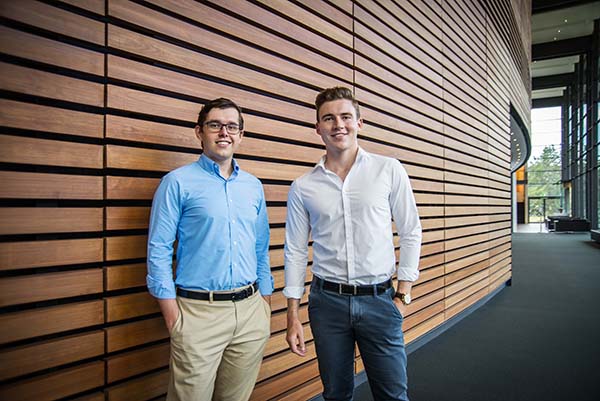Research published by two University of Queensland students has revealed that peer-to-peer lenders are more likely to accept lower financial returns if they know the project they are funding is socially and environmentally responsible.

Jason Lejcak (Bachelor of Economics (Honours)) and Benjamin Wiltshire (Bachelor of Commerce (Honours) and Bachelor of Science) co-authored the study as part of a research project with UQ’s Australian Institute for Business and Economics (AIBE), which was made possible thanks to a scholarship provided by two UQ alumni.
As part of the study, the pair examined data from a popular Australian peer-to-peer lending platform and found that small green loans – averaging around $8000 and used largely for renewable energy projects such as installing rooftop solar – had a 2.1 per cent lower interest rate than a comparable loan used for other purposes.
Mr Lejcak said while green loans comprised a small slice of the peer-to-peer lending market, they were a fast-growing category of loan requests.
“Peer-to-peer financial lending platforms provide individuals and smaller lenders with the opportunity to partake in social impact investing, which is traditionally outside the scope of banks and bigger lenders,” he said.
“When you think of the sharing economy, most people think of Uber (transport) and AirBnB (accommodation), but peer-to-peer lending is a really exciting and competitive area that’s opening up new and transforming existing markets.”
Mr Wiltshire said he would love to see peer-to-peer platforms adopt a social impact metric for loan requests.
“If these platforms could give peer-to-peer lenders access to a social impact metric, alongside the currently available credit rating metrics, we believe it could attract a larger audience and boost the lending activity on these platforms,” he said.
“In Australia, the sector is still quite small and unregulated, and while there’s still much to explore and understand, our research suggests implementing a social impact metric could change the game for renewable energy lending on peer-to-peer platforms.”
Read the report in full (PDF, 1 MB)
Mr Lejcak and Mr Wiltshire are the 2018 recipients of the Matthew McLennan and Richard Howes Outstanding Honours Collaboration Scholarship, which was established in 2014 and encourages teamwork between high-performing honours students from the UQ Business School and School of Economics.
Mr Wiltshire said working on this innovative peer research project had provided many personal and professional development opportunities.
“Beyond developing our research skills, I found it valuable to gain exposure to different perspectives – from Jason and our academic advisors – and learn how to bring our ideas, experiences and skills together to examine and contribute to the conversation on this pressing issue.”
Mr Lejcak thanked Mr McLennan and Mr Howes for providing this generous scholarship.
“As a student, knowing that you have UQ’s strong alumni network out there ready and willing to support you, that’s a really big plus, and this alumni-funded scholarship is an example of that. It’s incredible.”
Both students graduated from UQ in December 2018 and commenced as Global Markets Analysts at Citi Bank in Sydney in February 2019.
Learn how you can empower and support our students to reach their potential.
Media: media@bel.uq.edu.au, +61 7 3346 0700.



